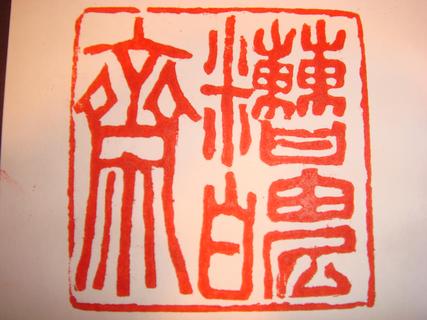
This street sign reminded me of a minor issue surrounding the classical reading of the character 樂. There are two common readings for this character: yue4 “music” and le4 “happy, pleased, amused”. A passage from Mencius (1.b) illustrates both of these meanings:
獨樂樂,與人樂樂,孰樂?曰:不若與人。Music by oneself, and music with others: which is more pleasurable? “It is better with others.”
The first and third instances of 樂 are yue4 music, while the second, fourth and fifth are read le4 meaning to enjoy or feel pleasure. There is a third, less common reading, yao4, purported to mean “to like, to desire”, which is obviously related to the sense of “to enjoy, happy, pleased”. It is this sense and reading that we wish to analyze here. The mostly commonly cited instance of yao4 “like” is Lunyu (Yongye):
子曰:知者樂水,仁者樂山;知者動,仁者靜;知者樂,仁者壽。The Master said, the wise love water; the humane love mountains. The wise are active; the humane are quiescent. The wise are joyful; the humane are long-lived.
There are very few other instances where 樂 is traditionally read yao4.
民生各有所樂兮, 余獨好修以爲常。Among the people, each has his penchant, only I love the good as my constant pursuit. (Qu Yuan, Lisao)
玩其所樂。 Amuses himself with what he likes. (Liji, “Liyun”) ·
籍平生曾游東平,樂其風土。During his lifetime (Ruan) Ji traveled in Dongping, and he liked their local customs. (Jin shu, Biography of Ruan Ji)
There are some problems and inconsistencies in the way the distinction is applied:
1. The issue of how to read a character only arises if an editor, usually centuries after the formation of the text itself, chooses to comment on it. Thus, the example from Lunyu (Warring States era) is traditionally read yao4 because Xing Bing 邢昺 and Zhu Xi 朱熹 (both Song) pointed it out in their comments. Likewise, Lu Deming 陸德明 (Tang) clarified the reading in the Liji (Han or pre-Han) passage cited, Hong Xingzu 洪興祖 (Song) the reading in the Lisao (pre-Qin) and so forth. If a character appears in an ancient text and no one comments on it, does it really have a reading? Other than in rhymed verse, it will not always be clear. The readings they used were obviously based on a tradition and in turn on the spoken language (even if of an earlier era), but it is not always clear that any useful purpose is being served. To the extent a grammatical distinction was being made (see 3 below), the inconsistent application of the readings (see 2 below) has obscured the grammatical distinction.
2. There are clear inconsistencies in how often the yao4 reading is applied. More often than not, it is read as le4, with most readers taking it to mean “take pleasure in”. For instance:
今惡死亡而樂不仁,是猶惡醉而強酒. Now they hate death and ruin but like inhumane behavior. This is like hating drunkenness but having a penchant for drink. (Mencius, 4.a) In this passage, 惡 wu4 “to hate” is put in apposition to 樂, which, if we are to take the apposition seriously should have strong implications of “to like” thus implying a “proper” reading of yao4.
As is clear from the examples cited above, 樂 very seldom, if ever, is used to mean simply “to like”. It always strongly retains the sense of “take pleasure in”. This can be illustrated by the fact that when the meaning of “to like” is needed in a given context, the character used is usually one with that unambiguous meaning, such as 好 hao4. Thus, the passage of Mencius where the enjoyment of music is discussed opens with the following statement: 王之好樂甚. [If] the king’s love of music were great… Mencius was possibly engaging in wordplay when he drew a connection between music and pleasure, but he could have taken it further with “liking” but did not. Confucius draws a clear distinction in meaning between 好“to like” and 樂 “to delight in” in the following passage of the Lunyu from the same chapter cited above: 知之者不如好之者,好之者不如樂之者。Those who know it are inferior to those who love it, and those who love it are inferior to those who delight in it. If 樂 ever meant simply “to like”, if would be difficult to interpret the words as Confucius means us to without ambiguity. Otherwise, the last clause could simply mean “those who love it are inferior to those who love it.”
.
3. In fact, the distinction between the readings le4 and yao4 is not really (or primarily) a semantic distinction, but rather a grammatical distinction, a distinction of usage. When 樂 is a stative verb without an object, it should be read le4 and be taken to mean “to be happy, to feel enjoyment, to be in a state of pleasure”. When it takes an object (really an indirect object) it should be read yao4 and means “to take pleasure in”. If this distinction were consistently applied, the number of instances where the character is read yao4 would greatly increase. The word is in fact frequently used as a verb meaning to take pleasure in, and for purposes of 破讀 or giving different readings to the character depending on its function (e.g. 度 du4 v. duo2, 治 zhi4 v. chi2, etc.), this distinction in the reading of 樂 should be made. In most editions, this has been extremely inconsistently applied at the same time that the word was perhaps burdened with an unwarranted semantic distinction.
So, applying the principle consistently, our street sign 樂古道 should be Yao4gu3 dao4, or the “Street of Taking Pleasure in Antiquity” (Cf. Lunyu, “Shuer”: 信而好古 Trusting and loving antiquity.)
[Note: The Cantonese distinction is between lok6, as in the sign (=le4), and ngok6 (=yao4). For the ancient phonological distinctions, under the Shijing rhyme schemes, all of yue4, le4 and yao4 are under 葯部, although by Middle Chinese, they had diverged to 覺,鐸 and 效, respectively.]

No comments:
Post a Comment